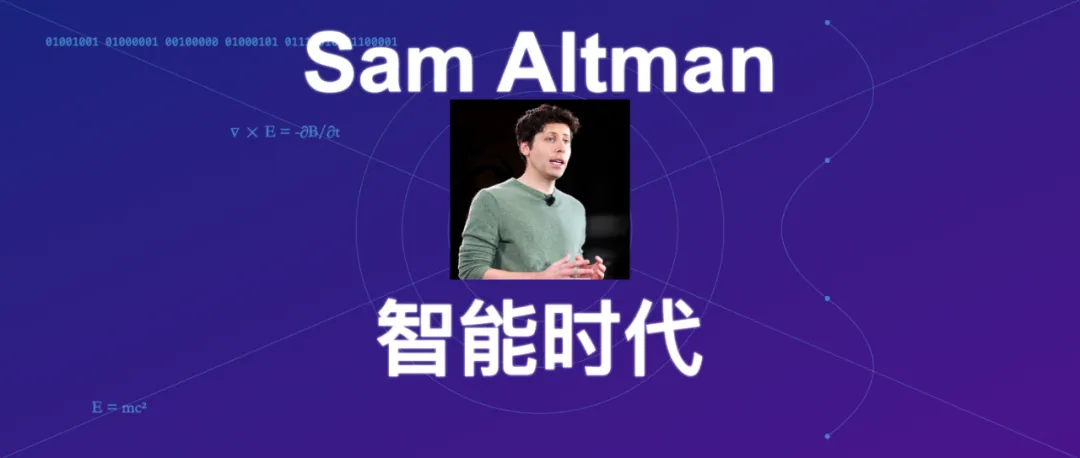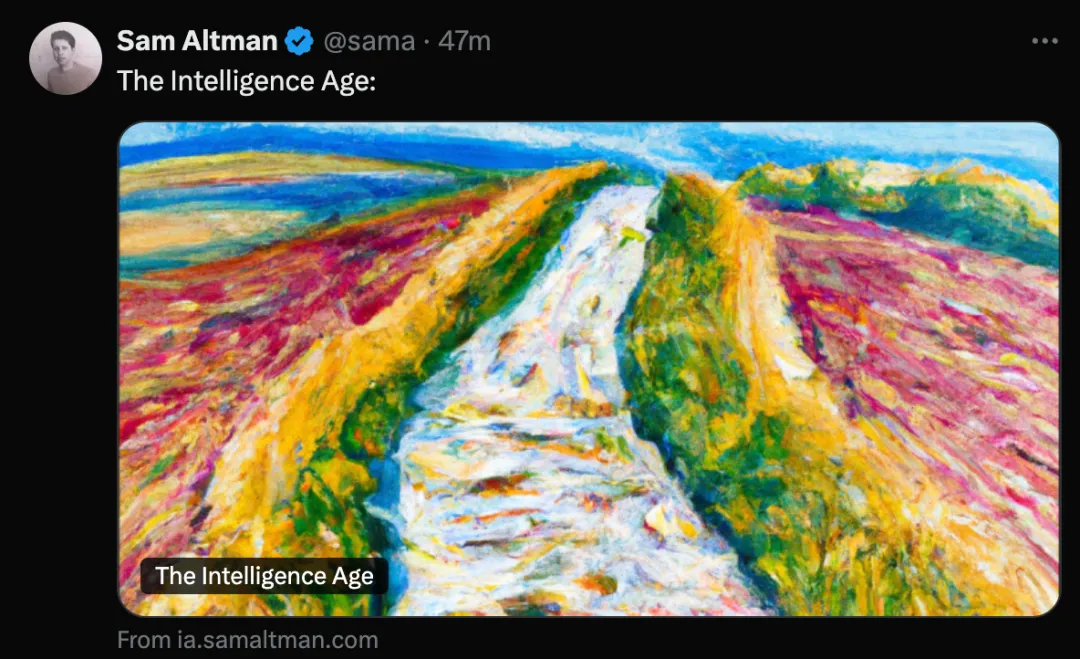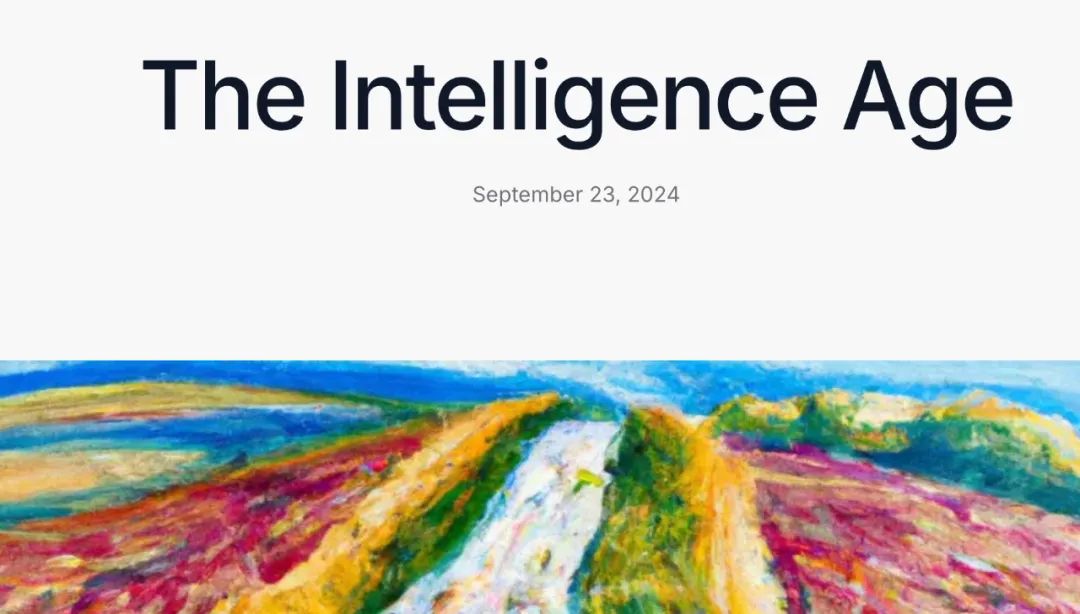
OpenAI CEO Sam Altman 刚刚发表了一篇雄文,展望了 AI 时代人类的未来

核心观点是:AI 将带来前所未有的,我们无法想象的繁荣,我们将进入一个“智能时代”
是不是感觉 Altman 又在画大饼了?别急,咱们照例先来划划重点:
人类历史中最具决定性的事实: 或许几千天内我们就能拥有超级智能!
深度学习凑效了: 随着规模扩大表现得越来越好
解决气候问题、建立太空殖民地、发现所有物理学定律: 最终将变得稀松平常
以下是中文全文:
智能时代
https://ia.samaltman.com

Sam Altman,
https://ia.samaltman.com
在未来的几十年里,我们将能够做一些在我们祖父母眼中如同魔法般的事情
这种现象并不新鲜,但将得到全新的加速。人类的能力随着时间推移显著提升;我们现在能够完成一些在前人看来不可能的事情。
我们的能力提高不是因为基因的改变,而是得益于社会基础设施的高度智能化与强大,超越了任何个体的能力;从某种重要意义上讲,社会本身就是一种高级智能。我们的祖父母——以及更早的世代——构建了伟大的成就。他们为人类进步架设了支撑体系,让后代从中受益。人工智能将赋予人们解决难题的工具,帮助我们建立新的支撑体系,完成我们自己无法做到的事情。进步的故事将继续发展,我们的后代将能够实现我们现在难以想象的事物。
这一切不会一蹴而就,但我们很快将能够与 AI 合作,帮助我们完成超出个人能力的事情;最终,我们每个人都可以拥有一个由虚拟专家组成的个人 AI 团队,共同创造我们想象中的几乎任何事物。我们的孩子将拥有虚拟导师,能够以任何
语言和适合他们的节奏提供个性化的教学。类似的概念还可应用于医疗保健改进、创建人们想象的各种软件等领域。
有了这些新能力,我们可以共享前所未有的繁荣;在未来,每个人的生活都可以比今天任何人的生活更加美好。虽然繁荣本身未必使人幸福——许多富人依然感到不快乐——但它的确会显著改善全球人们的生活。
从一个狭义的角度来看人类历史:经过数千年的科学发现和技术进步的积累,我们已经学会如何熔化沙子,加入一些杂质,以令人惊叹的精确度将其排列成微型芯片,并通过这些芯片运行能量,最终产生能够创造日益强大的人工智能的系统。
这可能是迄今为止整个历史中最具决定性的事实。或许几千天内我们就能拥有超级智能(!);也许时间会更长,但我确信我们将会实现这一目标
我们是如何到达这个即将跃升的繁荣时代的呢?用三个字来说:深度学习奏效了
用 15 个字来说:深度学习奏效了,随着规模扩大表现得越来越好,我们投入了更多资源
这就是核心;人类发现了一种能够真正学习任何数据分布(实际上是学习生成这些数据分布的“规则”)的算法。随着计算力和数据的增加,深度学习在帮助人们解决难题方面表现得越来越好,精确度令人惊叹。无论我花多少时间思考这个问题,我始终难以真正理解它的重要性
我们还有许多细节需要解决,但被任何具体的挑战所分散注意力都是错误的。深度学习有效,我们将解决剩余的问题。关于未来我们可以说很多事情,但最关键的是,随着规模的扩大,AI 将变得更好,并带来全球人民生活的显著改善。
AI 模型将很快成为自主的个人助理,替我们执行特定任务,例如协助管理医疗服务。未来,AI 系统将变得如此强大,以至于它们能够帮助我们设计出更先进的下一代系统,并推动各领域的科学进步
科技带领我们从石器时代跨入农业时代,再进入工业时代。从现在开始,通往智能时代的道路将由计算力、能源和人类的意志铺就
如果我们希望 AI 能够惠及更多人群,我们就需要降低计算成本并使计算资源充裕(这需要大量能源和芯片)。如果我们不构建足够的基础设施,AI 将成为一种非常有限的资源,可能引发战争,并主要成为富人掌控的工具
我们需要既明智又坚定地采取行动。智能时代的曙光是一次意义非凡的发展,伴随着极为复杂且风险极高的挑战。这将不是一个完全正面的故事,但它的巨大潜力使我们有责任为自己和未来找到应对这些风险的方法
我相信,未来将会如此光明,以至于没有人能够用文字真正描绘它;智能时代的一个重要特征将是前所未有的繁荣
虽然这一切将逐步发生,但令人惊叹的成就——解决气候问题、建立太空殖民地、发现所有物理学定律——最终将变得稀松平常。凭借几乎无限的智能和充裕的能源——即产生伟大想法的能力和实现这些想法的能力——我们能够做很多事情
正如其他技术一样,AI 也会带来负面影响,因此我们现在就应开始努力,最大化其好处,最小化其危害。例如,预计这项技术将在未来几年内对劳动力市场产生重大影响(既有好的一面,也有坏的一面),但大多数工作的变化速度会比人们想象的慢得多,而且我并不担心我们会无事可做(即使这些工作在今天看来并不像“真正的工作”)。人类天生有创造和互助的愿望,AI 将让我们比以往任何时候都更能发挥自己的能力。作为一个社会,我们将再次进入一个扩展的世界,并专注于正和博弈
我们今天所从事的许多工作,在几百年前的人们眼中或许显得微不足道,但没有人会回头怀念做点灯人。如果点灯人能够看到今天的世界,他会认为周围的繁荣简直是难以想象的。如果我们能快进到一百年后的今天,周围的繁荣也同样会让我们感到难以置信
英文全文,
The Intelligence Age
September 23, 2024
In the next couple of decades, we will be able to do things that would have seemed like magic to our grandparents.
This phenomenon is not new, but it will be newly accelerated. People have become dramatically more capable over time; we can already accomplish things now that our predecessors would have believed to be impossible.
We are more capable not because of genetic change, but because we benefit from the infrastructure of society being way smarter and more capable than any one of us; in an important sense, society itself is a form of advanced intelligence. Our grandparents – and the generations that came before them – built and achieved great things. They contributed to the scaffolding of human progress that we all benefit from. AI will give people tools to solve hard problems and help us add new struts to that scaffolding that we couldn’t have figured out on our own. The story of progress will continue, and our children will be able to do things we can’t.
It won’t happen all at once, but we’ll soon be able to work with AI that helps us accomplish much more than we ever could without AI; eventually we can each have a personal AI team, full of virtual experts in different areas, working together to create almost anything we can imagine. Our children will have virtual tutors who can provide personalized instruction in any subject, in any language, and at whatever pace they need. We can imagine similar ideas for better healthcare, the ability to create any kind of software someone can imagine, and much more.
With these new abilities, we can have shared prosperity to a degree that seems unimaginable today; in the future, everyone’s lives can be better than anyone’s life is now. Prosperity alone doesn’t necessarily make people happy – there are plenty of miserable rich people – but it would meaningfully improve the lives of people around the world.
Here is one narrow way to look at human history:after thousands of years of compounding scientific discovery and technological progress, we have figured out how to melt sand, add some impurities, arrange it with astonishing precision at extraordinarily tiny scale into computer chips, run energy through it, and end up with systems capable of creating increasingly capable artificial intelligence.
This may turn out to be the most consequential fact about all of history so far. It is possible that we will have superintelligence in a few thousand days(!); it may take longer, but I’m confident we’ll get there.
How did we get to the doorstep of the next leap in prosperity?
In three words:deep learning worked.
In 15 words:deep learning worked, got predictably better with scale, and we dedicated increasing resources to it.
That’s really it; humanity discovered an algorithm that could really, truly learn any distribution of data(or really, the underlying “rules” that produce any distribution of data). To a shocking degree of precision, the more compute and data available, the better it gets at helping people solve hard problems. I find that no matter how much time I spend thinking about this, I can never really internalize how consequential it is.
There are a lot of details we still have to figure out, but it’s a mistake to get distracted by any particular challenge. Deep learning works, and we will solve the remaining problems. We can say a lot of things about what may happen next, but the main one is that AI is going to get better with scale, and that will lead to meaningful improvements to the lives of people around the world.
AI models will soon serve as autonomous personal assistants who carry out specific tasks on our behalf like coordinating medical care on your behalf. At some point further down the road, AI systems are going to get so good that they help us make better next-generation systems and make scientific progress across the board.
Technology brought us from the Stone Age to the Agricultural Age and then to the Industrial Age. From here, the path to the Intelligence Age is paved with compute, energy, and human will.
If we want to put AI into the hands of as many people as possible, we need to drive down the cost of compute and make it abundant(which requires lots of energy and chips). If we don’t build enough infrastructure, AI will be a very limited resource that wars get fought over and that becomes mostly a tool for rich people.
We need to act wisely but with conviction. The dawn of the Intelligence Age is a momentous development with very complex and extremely high-stakes challenges. It will not be an entirely positive story, but the upside is so tremendous that we owe it to ourselves, and the future, to figure out how to navigate the risks in front of us.
I believe the future is going to be so bright that no one can do it justice by trying to write about it now; a defining characteristic of the Intelligence Age will be massive prosperity.
Although it will happen incrementally, astounding triumphs – fixing the climate, establishing a space colony, and the discovery of all of physics – will eventually become commonplace. With nearly-limitless intelligence and abundant energy – the ability to generate great ideas, and the ability to make them happen – we can do quite a lot.
As we have seen with other technologies, there will also be downsides, and we need to start working now to maximize AI’s benefits while minimizing its harms. As one example, we expect that this technology can cause a significant change in labor markets(good and bad)in the coming years, but most jobs will change more slowly than most people think, and I have no fear that we’ll run out of things to do(even if they don’t look like “real jobs” to us today). People have an innate desire to create and to be useful to each other, and AI will allow us to amplify our own abilities like never before. As a society, we will be back in an expanding world, and we can again focus on playing positive-sum games.
Many of the jobs we do today would have looked like trifling wastes of time to people a few hundred years ago, but nobody is looking back at the past, wishing they were a lamplighter. If a lamplighter could see the world today, he would think the prosperity all around him was unimaginable. And if we could fast-forward a hundred years from today, the prosperity all around us would feel just as unimaginable.

















